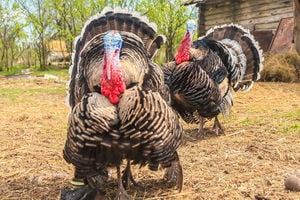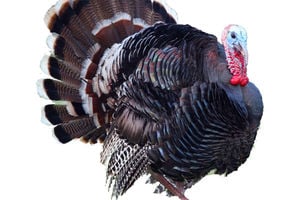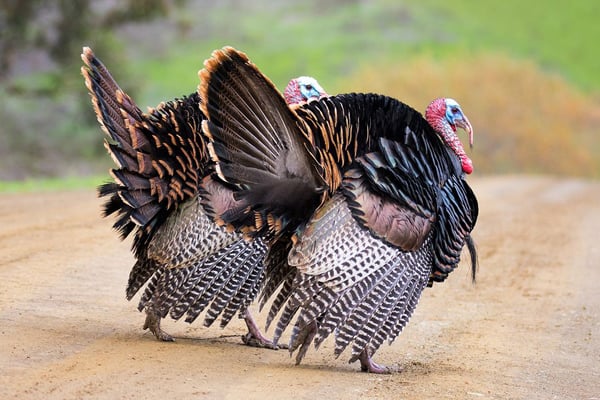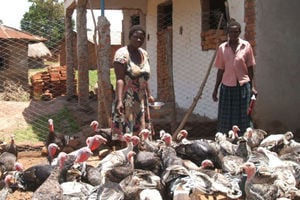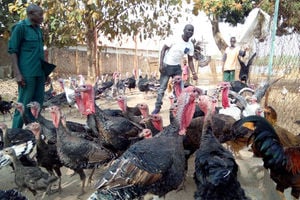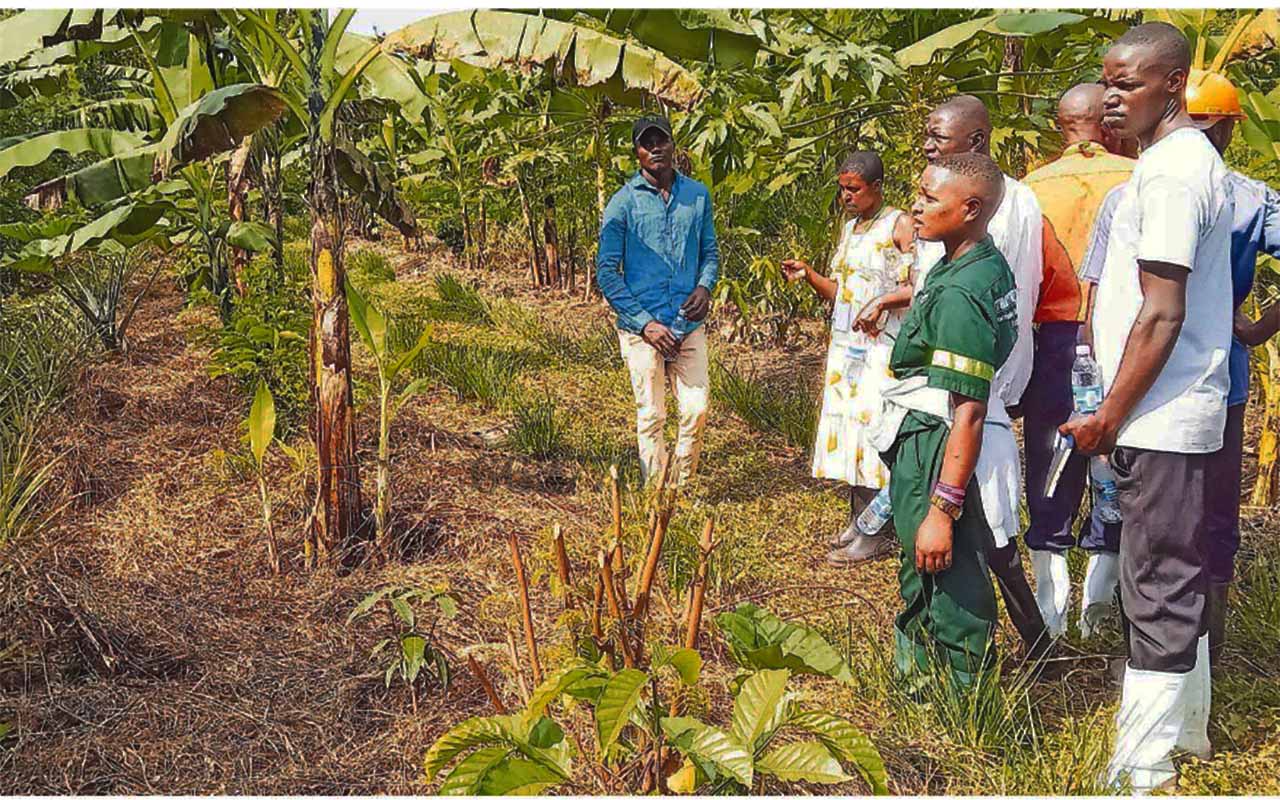
Male turkeys can grow up to 20kg in just months and fetch a huge price. PHOTO/ ABDUL-NASSER SSEMUGABI
Dr Gerald Akankwasa, a general physician at Mulago Hospital, started his backyard flock in Jokolera, Kasangati Town Council, Wakiso District, with just three turkeys in early 2023.
Barely two years later, he now has more than 170 birds of different ages. And with his determination and investment, he may soon become one of the major suppliers of turkey meat around Kampala.
Accidental beginnings
Akankwasa was leaving Kumi Hospital, in eastern Uganda after performing a surgery to fix a patient’s fractured leg when he saw women selling turkeys just opposite. He bought two hens at Shs70,000 and a tom (male) at Shs75,000.

This was meant for Easter and the days that would follow. But a week later, Akankwasa got an emergency to fly a cancer patient to India, inadvertently giving the birds a chance to escape the knife.
Two weeks later, his gardener was mowing the compound when he found eggs hidden under grass. Over the phone, Akankwasa told him to shield the eggs from rain, and leave them intact. “We didn’t even think turkey eggs were edible,” said the medical doctor by profession, a farmer by passion.
Soon, one hen went broody and 28 days later hatched 27 healthy poults out of 30 eggs.
Still in India, Akankwasa was excited and confused. “What do we do with the chicks?” he wondered. Roaming with their mother, they started dying. No one knew why.
On Akankwasa’s request, a neighbour who rears chicken, vaccinated and treated them for days. The death toll was reduced.
After eight weeks in India, Akankwasa returned. And on his errands downtown, he met Ofwono, who hawks geese and turkeys. He advised him to separate the babies from their parents.
“The mother may be careless, and males usually kill the young males to avoid losing their territory,” Ofwono told him.
Business mind
Like any potential investor, Akankwasa asked about the market. Ofwono told him he sells at least five turkeys a day, hens at Shs90,000 and toms at Shs150,000. “This can be serious business,” Akankwasa thought to himself.
He looked back to the Covid-19 times when people were stuck home. Foodless, some hopeless. He thought: turkeys’ delicious and nutritious white meat and eggs can be food and a source of income.
He turned the small structure, meant for guards, into the brooder. “I bought the babies pellets, vaccinated them regularly, and 13 survived.” A business was born.
Soon, he bought seven hens, three toms from Ofwono, each at Shs50,000, to expand his parent stock. All were crossbreeds of the exotic white and local black, which is resistant to diseases with a good growth rate.
You just don’t throw foreigners into your flock. Otherwise, you are risking infections. Akankwasa isolated the 10, vaccinated them against fowl pox—the biggest killer of turkeys—gave them antibiotics and fumigated them to kill virus, bacteria or parasites.
After three days, he integrated them with the residents and after some fights, the newcomers were finally accepted. But they were wilder. They could jump over the fence, mess up neighbourhoods and scatter their eggs there.
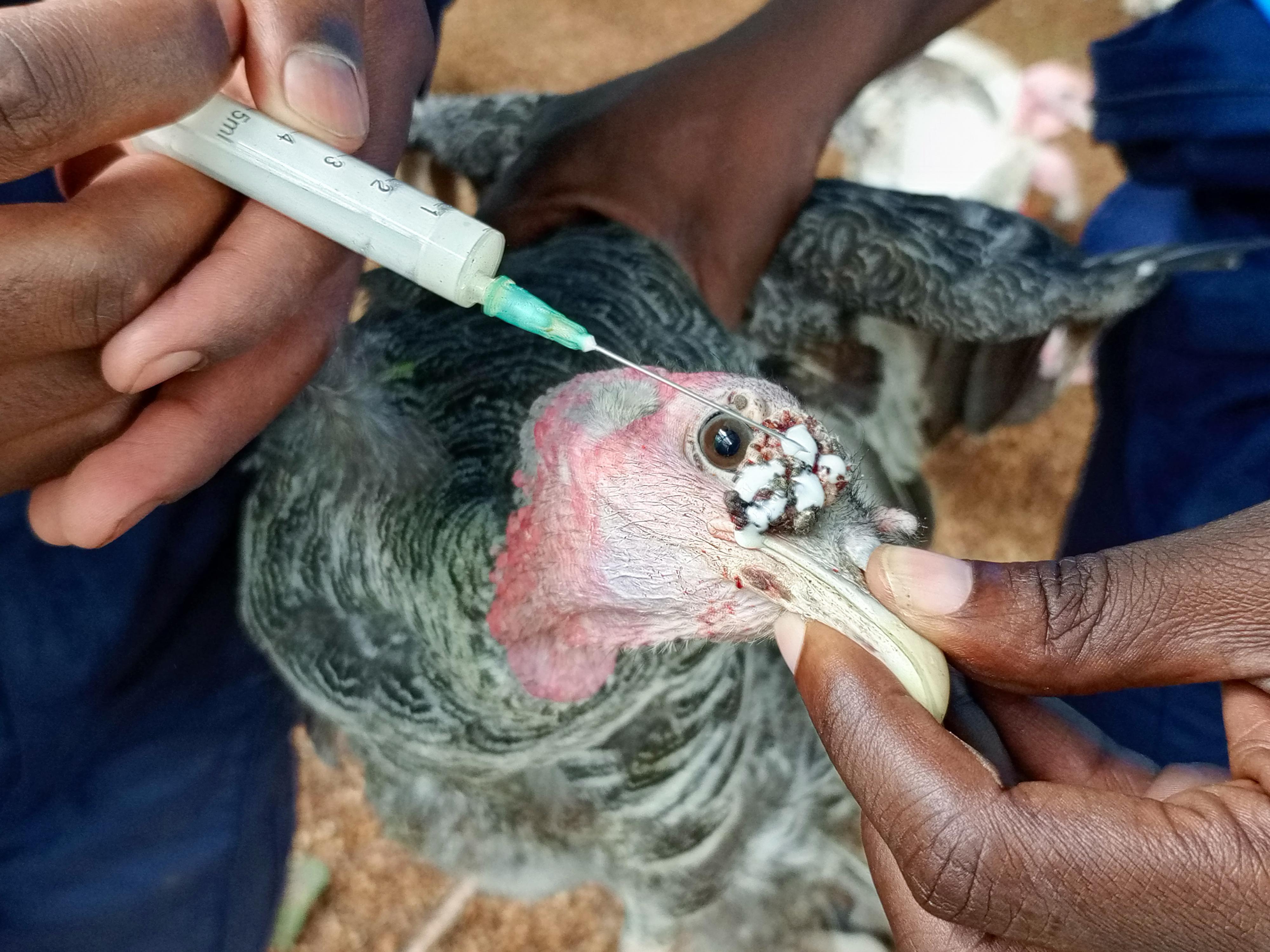
Quick response to fowl pox symptoms can be helpful. PHOTO/ ABDUL NASSER SSEMUGABI
A dog sneaked into the gate and killed a brooding hen. The loss hurt deep. It became an emergency.
Akankwasa caged them. No work done. They jumped over the five-foot wire mesh, messed up the compound, etc. “I was fed up,” his wife Rose Atukunda told me. Until they enclosed them in 15x15 ft space with a strong green net.
Expansion
Soon, about seven were laying. But of the 48 poults hatched, about 15 died. “Such losses had stopped.” Akankwasa blamed it on the reckless caretaker, who had replaced the first one.
Then came Ivan, a young, creative and teachable boy. He made more nesting boxes, which improved egg management. They started storing the fresh eggs on trays, until a hen goes broody. Once, 10 hens sat on a total of 104 eggs, hatching 89.
When thieves broke into the gate, Akankwasa bought two pairs of geese to bolster security. On sensing intrusion, they make noise, the male turkeys amplify and the dog backs up the choir. You must be a bold intruder to stand that chaos.
The geese are now 18 after the two mothers hatched all their 14 eggs. A pair goes for at least Shs350,000 but Akankwasa isn’t in a hurry to sell. “After all, they serve their purpose and are easy to manage. They never fall sick.” He also bought 40 guinea fowl eggs, gave them to broody turkeys. 38 hatched. Only one died.
Brooding; inbreeding
From Ofwono’s advice Akankwasa quickly learnt that keeping baby turkeys in a brooder is a masterstroke. He feeds the poults on broiler starter crumbs, for about two weeks, then grower pellets 24 hours, with consistent light and warmth. He vaccinates and introduces them to green stuff—shrubs, marijuana—which is also medicinal. This is what stimulates growth and minimises infant mortality.
What’s more, without babies to mind, mothers may resume laying within three weeks.
Of the 176, Akankwasa has about 50 males. He said seven hens to three toms is the ideal ratio for a parent stock. Fewer males won’t mount enough, hence poor fertilisation rates.
And excess males trigger fights, sometimes death as they want to mark territory.
To minimise inbreeding, another cause for stunted growth and infant mortality, Akankwasa has sold some four males every six months. It’s a practice he intends to continue.
Biosafety, no chicken
Any poultry farmer needs a ready, legitimate vet. But biosafety and hygiene are paramount. Timely vaccination is a must: Newcastle—at 10 days, again at four weeks; fowl pox at 12 to 16 weeks.
Except for the intermittent noise from the birds, the home is clean. No flies, no foul smell common in livestock environments.
The enclosure, which also covers the roof, fends off predators and wild birds which may carry bird flu, among other diseases.
Ivan, the caretaker, often sprays the area to repel mosquitos, which injure turkeys, flies and other parasites.
“The idea is to produce a very organic product without a lot of injections and antibiotics. So prevention is key.”
When Akankwasa spotted a hen with a huge scab in the face, he caught it for Ivan to apply a mil of ointment. Fowl pox has no treatment but such interventions help.
Sometimes, they use a thermometer to detect fevers. The floor is covered with coffee husks which may last six to 10 months. But geese—habitual swimmers—are in a separate compartment with bare earth and a basin of water.
Once a chicken farmer, Akankwasa has no single chicken at home. He fears they may infect his turkeys with blackhead—a disease chickens often carry without symptoms but deadly to turkeys.
One wooden pen inside the confinement hosts broody mothers in old car tyres. Another hosts juveniles from the brooder before they are integrated with the main flock. Otherwise, they may be stressed and get stunted.
Feed management
Each turkey seven weeks and older needs 250 grammes of feed daily but can eat even a kilogramme. So you must ration because the excess is costly and won’t be converted into eggs or meat.
Akankwasa feeds his flock 125gm of commercial feed divided twice a day. In between, he supplements it with shrubs, banana leaves, etc.
Sometimes, he mixes 100kg of broken maize, 35kg soy, 10kg fish and 5kg salt. But he prefers mixing 100kg of broken maize with 50kg of Koudijs layer concentrate, his magic bullet for eggs. And it’s cheaper than the conventional formula; and safer because fish and soy may be contaminated.
Giant leap
Akankwasa’s flock has multiplied impressively over 18 months. But the latest incubation cycle which yielded just 60 poults out of 180 eggs was disappointing. Did the rains stress the mothers? Or were the temperatures irregular? Akankwasa wondered. It prompted him to acquire an incubator. The 200-egg machine, worth Shs3.5m, operates in the garage. In case of load shedding, he switches to solar. It has a candling function to identify hatchable eggs from others by the 19th day. His first batch is due November 10.
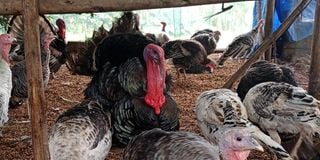
You need to keep a healthy female to male ratio for good fertility rates and peace in your turkey flock. PHOTO ABDUL-NASSER SSEMUGABI
Akankwasa stocks whole maize from upcountry farmers at fairer prices. But he’ll be growing his own, soon.
“There’s no reason a farmer should buy mash or finished pellets,” he said. “They’re being cheated when they buy adulterated or infected feed from commercial dealers.”
In two months, he will have a pellet machine from India worth Shs4.5m. It will process 300kg for 2.5 litres of diesel.
Pellets are easier to digest and minimise feed loss because even if they are spilled to the ground, birds easily pick them up, unlike mash.
Plus, pellets can be fortified as much as one wants, without changing size. “So, I can even add the grass in the process.”
Most of Akankwasa’s turkeys are ready for meat by 24 weeks (six months) and the hens start laying eggs at about 30 weeks (over seven months).
By Christmas, he wants to sell off 90 percent of his mature birds to create space for the younger generations coming soon from the incubator.
“In the morning, we give them layer’s feed, in the evening broiler feed,” he explained how he balances the need for fertilised eggs and good body weight towards Christmas.
The future
He has sold two toms, each at Shs220,000, and several hens of the original parent stock, each at Shs90,000. Good stuff. But his targets are smarter.
He is importing three freezers and plans to supply his sisters in Kampala suburbs with slaughtered turkeys. “I will do branding and online marketing.”
A hen weighs about 4kg, a tom may even reach 20kg. So if he sells a kilo at Shs15,000 he may get Shs300,000 from one tom.
His backyard can accommodate 300 turkeys. But next year, he plans to start another flock of 500 in Kalaji, on Gayaza Road.
Then, he may even venture into selling poults, after all, a day-old goes for Shs10,000. Meaning, 100 poults a week fetch Shs1m, which can cover feed costs. “It’s potentially good business; I don’t want anything to divert me.”
THE FUTURE
has sold two toms, each at Shs220,000, and several hens of the original parent stock, each at Shs90,000. Good stuff. But his targets are smarter. He is importing three freezers and plans to supply his sisters in Kampala suburbs with slaughtered turkeys. “I will do branding and online marketing.
